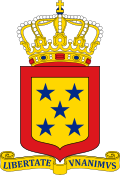 |
|---|
General elections were held in the Netherlands Antilles on 4 June 1962.
Contents
The 22 seats in the Estates of the Netherlands Antilles consisted of twelve for Curaçao, eight for Aruba, one for Bonaire and one for the SSS Islands.
 |
|---|
General elections were held in the Netherlands Antilles on 4 June 1962.
The 22 seats in the Estates of the Netherlands Antilles consisted of twelve for Curaçao, eight for Aruba, one for Bonaire and one for the SSS Islands.
| Party | Island | Votes | % | Seats | |
|---|---|---|---|---|---|
| National People's Party | Curaçao | 22,526 | 32.56 | 7 | |
| Democratic Party | Curaçao | 18,953 | 27.40 | 5 | |
| Aruban Patriotic Party | Aruba | 10,613 | 15.34 | 5 | |
| Aruban People's Party | Aruba | 6,289 | 9.09 | 3 | |
| Constructive People's Party | Curaçao | 2,529 | 3.66 | 0 | |
| Aruban People's Union | Aruba | 1,488 | 2.15 | 0 | |
| Bonaire Democratic Party | Bonaire | 1,453 | 2.10 | 1 | |
| Radical People's Party | Curaçao | 1,259 | 1.82 | 0 | |
| United Progressive Bonairean Party | Bonaire | 1,121 | 1.62 | 0 | |
| Democratic Party | SSS Islands | 893 | 1.29 | 1 | |
| Windward Island's Progressive Party | SSS Islands | 747 | 1.08 | 0 | |
| Curaçaoan People's Union | Curaçao | 603 | 0.87 | 0 | |
| Aruban Labour Front | Aruba | 372 | 0.54 | 0 | |
| Windward Island's Progressive Party | Aruba | 329 | 0.48 | 0 | |
| Total | 69,175 | 100.00 | 22 | ||
Population: 127,164 (31 December 1961)
Valid votes: 45,870
Seats: 12
Average valid votes per seat: 3,822.5
Members of the Estates of the Netherlands Antilles for Curaçao:
Population: 57,347 (31 December 1961)
Valid votes: 19,091
Seats: 8
Average valid votes per seat: 2,386.375
Members of the Estates of the Netherlands Antilles for Aruba:
Population: 5,896 (31 December 1961)
Valid votes: 2,574
Seats: 1
Population: 4,985 (31 December 1961, Sint Maarten: 2,928; Sint Eustatius: 1,044; Saba: 1,013)
Valid votes: 1,640
Seats: 1
| # | Candidate | Total per list | Votes | Result |
|---|---|---|---|---|
| Democratic Party | ||||
| 1 | A.C. Wathey | 893 | 496 | Elected |
| 2 | Th.V.H. Hassel | 171 | - | |
| 3 | C.A. Woodley | 141 | - | |
| 4 | G.B. Halley | 55 | - | |
| 5 | C.C. Peterson | 2 | - | |
| 6 | W.C. Anslijn | 28 | - | |
| Windward Island's Progressive Party | ||||
| 1 | H.I. Lopes | 747 | 332 | - |
| 2 | Ch.E.W. Voges | 102 | - | |
| 3 | H.C. Every | 255 | - | |
| 4 | A.T. Donker | 13 | - | |
| 5 | A. Smidt | 5 | - | |
| 6 | C.J. Hazel | 40 | - | |
On 2 November 1962 the Third Jonckheer cabinet was formed.